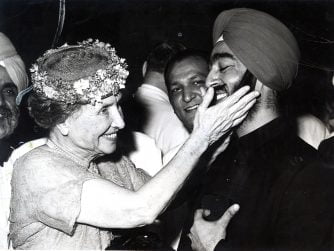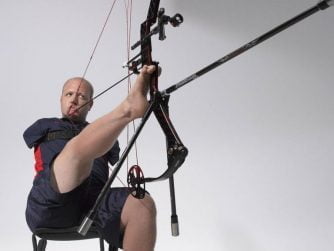Voice 1
Welcome to Spotlight. I’m Nick Page.
Voice 2
And I’m Liz Waid. Spotlight uses a special English method of broadcasting. It is easier for people to understand, no matter where in the world they live.
Click here to follow along with this program on YouTube.
Voice 1
The crowds of people filled the street. They were waving British flags. They were waiting, patient, but excited Suddenly, the crowd began to cheer. A young man rolled past them in his wheelchair. He could not walk. Instead, his chair carried him forward. He was carrying the Olympic torch. The torch held a fire. People had carried it from Greece all around the world. Now it was on the last part of the trip to London and the Olympic Games.
Voice 2
Dan Eley was the man in the wheelchair. In his community, many people know him. After a terrible accident, he did not know if he could survive. But now, he was making a new life for himself. Today’s Spotlight is on Dan Eley.
Voice 1
Eley grew up in Britain. But as a young man, he became very interested in Latin America. He learned about the problems of street children. These children do not have homes or families. They live on the street.
Voice 2
Eley wanted to help these children. So he moved to Latin America. He started in Guatemala. There, he worked with the organization Casa Alianza. The head of this organization is Fred Shortland. He told the news organization Get Surrey,
Voice 3
“His first job was on the streets. It is the most difficult job. He was excellent. He stayed with us for one year, and then went to work with smaller organizations in El Salvador.”
Voice 1
After some time in El Salvador, he moved to Colombia. He came to love the country and its people. He started to teach in a school in Cali, the third largest city in Colombia. He told Spotlight,
Voice 4
“I immediately fell in love with the place. Colombia is a wonderful country. I was welcomed, and made friends very quicky. In 2009, I started work as an English teacher.“
Voice 2
But then his life changed forever. It was New Year’s Day 2010. Eley dived into a river. But the water was not deep enough. His head hit the bottom, and he broke his neck. Eley was paralyzed. He could not move any part of his body.
Voice 1
Eley needed to return to England. But medical transport costs a lot of money. For Eley, the trip would cost 90,000 pounds. Eley’s family could not pay. But friends in England began to work together. They started a project on the internet to raise money. Within five weeks, they had all the money they needed. Eley made the trip home. He told Spotlight,
Voice 4
“At that time I felt very bad, and I was aware of this going on around me and it was something that gave me a lot of strength. The amount of people, including people that I did not know – that was an amazing thing. I felt the warmth and love and the greatness of human nature. It was very moving and very encouraging at a very difficult time.“
Voice 1
For almost a year Eley stayed in a hospital for paralyzed people. There, Eley received specialized treatment. It was designed to help him move more, and gain strength. He exercised every day. He still could not move his legs. And his arms were still very weak. But he began to feel more hope about his future.
Voice 2
Finally, at the end of 2010, Eley moved out of the hospital. He returned to his family’s town of Godalming. He moved into a home for people with disabilities. There he continued with his exercises. He started using an exercise bicycle. Bicycles usually travel on two wheels. This bicycle did not move. It was just for execise. The bicycle used electricity to help Eley’s legs move. Sometimes he also used his arms to move the pedals. This exercise helped Dan get stronger. As he bicycled, he had more movement in his arms and hands. He even used this exercise to raise money for research into paralysis treatment.
Voice 1
The bicycling project was only the beginning for Eley. He had not forgotten his friends in Colombia. His dream was to go back. He told Spotlight,
Voice 4
“People think I am crazy actually, because I wanted to go back a few months after the accident. I felt that, although I had had a tragic accident there, that I had changed me, the country and also Cali.“
Voice 2
Finally, in October 2011, Eley travelled back to Colombia. With his mother, he returned to the hospital he stayed in after his accident. He thanked the doctors and nurses there. And he even got a new treatment.
Voice 1
He also met with an organization called FEDUT – the Foundation for Education for All. It trains young people who do not have an education. The young people learn computer skills. They also learn how to manage money for businesses. These two skills are in high demand in Colombia. By getting training in these areas, the young people can get jobs. This was just the kind of work Eley had done when he lived in Latin America. He decided that he could continue to support this work.
Voice 2
When Eley returned home he set up the Dan Eley Foundation. This organization supports FEDUT and other similar organisations. He said,
Voice 4
“I started to think about ways that I could give back to this country. It has given me so much in help There is the wonderful welcome and the kindness of the people, but then there is a very high level of poverty in the city. Many young people are working in informal work on the streets when they could be at school.“
Voice 1
By then, however, another exciting thing was waiting for Eley. The local government had chosen him to carry the Olympic torch. He was surprised but proud. In his community, many people knew him. And carrying the torch was a way for him to thank the many people who had supported him.
Voice 2
Eley’s life changed forever after his accident. But he is making a new life, with the support of his friends and community. He is continuing his work in encouraging and building up young people. And he has continued his connection to the people of Colombia. His hope for the future shows that life does not have to end after a tragedy.
Voice 1
The writer of this program was Shelagh Godwin. The producer was Luke Haley. The voices you heard were from the United Kingdom and the United States. All quotes were adapted for this program and voiced by Spotlight. You can find our programs on the internet at www.radioenglish.net. This program is called, ‘Hope After an Accident’.
Voice 2
We hope you can join us again for the next Spotlight program. Goodbye.
Question:
Have you met anyone who has become paralyzed after an accident? How does your country help persons with disabilities?






Ihave not meet person after accident
The country could not help the person dis ability because the country is poverty
Thank you for your outstanding effort
I would also like to inform you that the text is not complete and there is an unwritten piece
Thank you for your comment. We would like to know what piece is missing. Thanks!
I have never met anyone who was paralyzed after an accident.
According to a 2020 Human Rights report: “Although the law mandates access to buildings and promotes equal access to health, education, social security, employment, transport, and communications for persons with disabilities, the government did not fully enforce it.”
I’ve never known anyone who was paralyzed after an accident, but I think that must be horrible for the family. Honduras has laws and policies to protect the rights of people with disabilities, including access to education, employment, and public services. However, the implementation of these policies can vary, and there may still be challenges in providing adequate support and accessibility for individuals who have become paralyzed or have other disabilities. Support often comes from a combination of government initiatives and community-based organizations working to improve the lives of people with disabilities through advocacy, services, and awareness campaigns.
I haven’t personally met anyone who became paralyzed after an accident,. In my country, there are laws and organizations dedicated to ensuring the rights and inclusion of persons with disabilities.